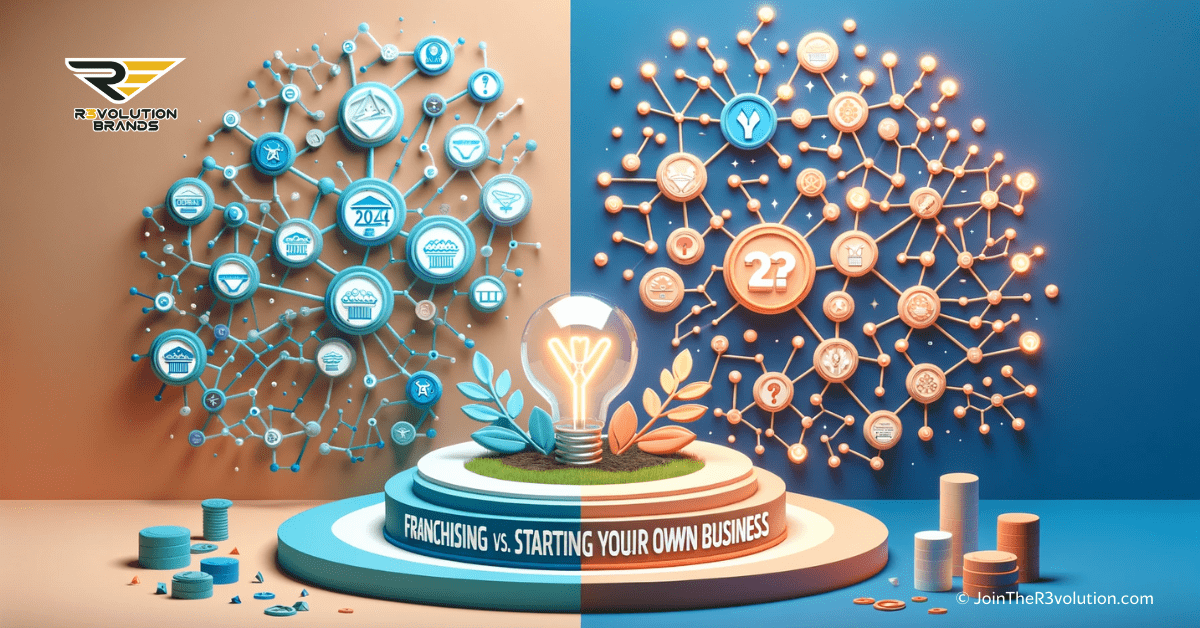In the ever-evolving entrepreneurial landscape of 2024, the decision between franchising and starting your own business is an important one. Both paths offer unique opportunities and challenges, and understanding the financial implications, growth potential, and real-life success stories can help guide your decision-making process.
In this blog post, we will explore the changing landscape of franchising and the startup ecosystem in 2024, delve into the financial implications and growth potential of both paths and share inspiring real-life success stories and valuable learning experiences from both franchises and startups.
The Evolving Landscape of Franchising and Startup Ecosystems in 2024
The world of franchising and startups has seen tremendous growth and evolution in recent years.
In 2024, entrepreneurs have access to a more diverse range of franchise opportunities than ever before. Franchises have expanded beyond traditional industries such as food and retail, now encompassing sectors like wellness, technology, and professional services. This diversification provides entrepreneurs with a greater variety of options when exploring the franchise route.
Similarly, the startup ecosystem has also experienced significant changes and advancements. The rise of technology and digital innovation has opened up new possibilities for startups, enabling them to disrupt established industries and create entirely new markets.
In 2024, startups have access to advanced technologies, funding opportunities, and supportive communities that foster innovation and collaboration.
Financial Implications and Growth Potential of Franchising vs. Startups
Understanding the financial implications and growth potential of franchising and startups is crucial for aspiring entrepreneurs. Here, we’ll explore the distinct aspects of each path.
Franchising
Franchising offers a unique financial model that combines the benefits of business ownership with the support of an established brand. The initial investment in a franchise typically includes upfront fees and ongoing royalties paid to the franchisor.
While the initial costs of franchising can be higher than starting a business from scratch, the established brand awareness and operational systems can help mitigate risks and accelerate growth.
The growth potential of a franchise lies in expanding through multiple locations. As the franchisee establishes and successfully operates one unit, they can explore opportunities to open additional units, benefitting from economies of scale and an established customer base.
Startups

Startups often rely on external funding sources, such as angel investors, venture capital, or crowdfunding, to finance their growth. While the financial requirements of startups can be demanding, the potential for rapid growth and significant returns on investment attracts many entrepreneurs.
Unlike franchises, startups have the advantage of starting with a clean slate, allowing for complete creativity and flexibility in shaping the business. However, the growth potential of startups is closely tied to their ability to secure funding, develop a scalable business model, and adapt to dynamic market conditions.
Learning Experiences from Both Paths
- Learning Experience from Franchises: Franchises offer the advantage of following a proven business model. However, it is essential for franchisees to carefully evaluate the franchise agreement, ongoing expenses, and support provided by the franchisor. Conducting thorough due diligence and understanding the market potential in specific locations are critical to maximizing success as a franchisee.
- Learning Experience from Startups: Startups require a strong entrepreneurial mindset and a willingness to adapt to changing circumstances. Founders should build a diverse and talented team, seek mentorship and guidance from experienced entrepreneurs, and remain resilient in the face of setbacks. Learning from failures and embracing iteration can be key to long-term success.
Knowing the Path to Follow
The decision between franchising and starting your own business in 2024 is a significant one, with both paths offering unique benefits and challenges.
The franchising landscape has expanded into diverse industries, providing entrepreneurs with established brand awareness and operational support. Startups, on the other hand, leverage innovation and creative freedom to disrupt markets and achieve rapid growth.
Understanding the financial implications, and growth potential, and learning from real-life success stories and experiences can guide entrepreneurs in making an informed decision. Whether you choose the proven path of a franchise or the exhilarating journey of a startup, success lies in strategic planning, dedication, and an unwavering passion for your chosen venture.





